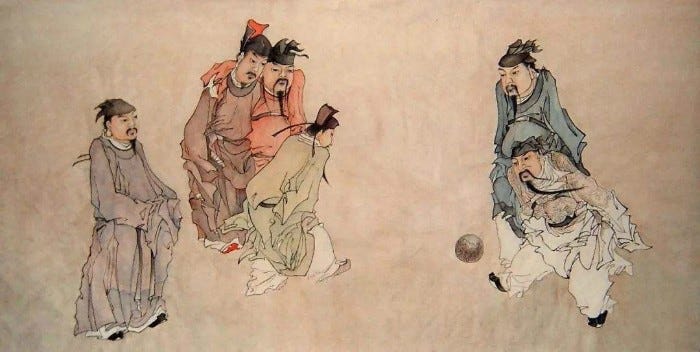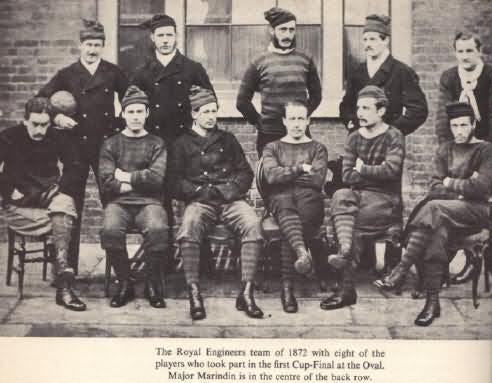Unraveling Football's Rich History: From Ancient Roots to Contemporary Evolution
Step into the realm of JamesOnFootball, where the echoes of history resonate alongside the vibrant rhythms of European football. Each week, I'll transport you through time with captivating historical narratives, seamlessly woven with my astute analysis of the latest football news and results across the continent. Join me on this exhilarating journey where the past and present collide, offering a unique perspective that only JamesOnFootball can provide
In the annals of history, the roots of football stretch back to ancient civilizations, weaving a tapestry of cultural significance and sporting heritage. From the sands of time emerge tales of Cuju, the Chinese precursor to football, where leather balls flew amidst the prowess of the Han Dynasty. Yet, amidst myth and legend, the evolution of the beautiful game took diverse paths across continents.
In medieval Japan, the aristocracy embraced Kemari, a graceful dance of skill and tradition played amidst serene landscapes. As feudal Japan evolved, Kemari faded into obscurity, a relic of a bygone era preserved by the elite few.
Across the oceans, in the heart of North America, Native American tribes engaged in their own ball games, reflecting a symbiotic relationship between sport and spirituality. Meanwhile, in Europe, the British Isles bore witness to a tumultuous saga of football's emergence.
Legend intertwines with reality as tales of English football's origins echo through time. From the macabre imagery of Danish warrior heads to the fervor of religious festivities, football found its place amidst the urban class of England. Celtic nations, bound by a common disdain for English intrusion, forged their own versions of the game, a testament to cultural resilience amidst historical turmoil.
Yet, football's journey was fraught with challenges. In the corridors of power, rulers sought to quell the fervent spirit of the game, viewing it as a distraction from martial pursuits. King Edward III's edicts and subsequent bans failed to extinguish the passion that burned within the hearts of the peasantry.
The Birth Of Modern Football
As Britain transitioned into the industrial age, football faced new hurdles. Urbanization encroached upon the open spaces where the game once thrived, while the relentless march of time demanded more from the populace. Yet, amidst the chaos of progress, football found an unlikely sanctuary in English public schools.
Football was a sport played at Cambridge and Oxford from around the 16th century though the upper class never truly took to it until the public schools eagerly adopted the game in the 19th century to help promote the Victorian values of discipline, selflessness, righteousness, patriotic duty, and manliness. This philosophy was also known as muscular christianity and was in vogue during this period and Sport was seen as a way of protecting the purity of young men from the evils of ‘masterbation’ and the sin of ‘homosexuality.’
Students of these public schools consisted of the sons of the old landed class and the new commercial elites, this was not a place for the lower class and only wealth mattered for entry. Often brutal and unforgiving places, it was very common to see fights between students and teachers, as well as with the locals; Harrovians could often be found battling with the workers who worked on the railway lines.
It was within these anarchic institutions that the modern incarnation of football took shape. Guided by rules and structure, the game shed its chaotic past to emerge as a disciplined sport. The ethos of fair play and competition permeated the schoolyards, laying the foundation for football's global ascent.
Many schools had their own rules which created the need for a form of regulation. For example Charterhouse allowed for 20-a-side where dribbling was permitted but you could not handle the ball; at Uppingham, the goal was the width of the pitch; and at Rugby, handling was allowed but you could not run with the ball. With such a contrast in styles and rules, something had to be done and attempts were made to codify the game.
J.C.Thring, an assistant master at Uppingham, had the first go, creating the Cambridge rules in 1846. Violence was prohibited, the ball could be handled so long as it was then directly set on the ground and kicked, and standing in front of the ball was off-limits. Further efforts to codify the game took place in Sheffield in the mid-1850’s, where the Sheffield FC - the world's oldest club - were formed in 1857.
Finally in what we now know as the birth of the modern game, in 1863 rules known as ‘The Simplest Game’ were published. A historic meeting subsequently took place at the Freemason’s Tavern in London on the 26th October 1863 that created ‘a definite code of rules for the regulation of the game of football’ and was chaired by Charles Allcock with 11 clubs in attendance; This is also the official date the English Football Association was established.
Of those 11 clubs in attendance, 1 of the clubs - Blackheath - strongly objected to the new rules, especially the fact that ball carrying and hacking were no longer part of the game. Blackheath resigned from the FA and created a Rugby club that is still active in the sport to this day. An interesting quote came from a Mr Campbell regarding this irreconcilable difference, ‘you will do away with the courage and pluck of the game, and I will be bound to bring over a lot of Frenchmen who would beat you with a week’s practice.’
Though the game’s formation still is seen through the eyes of London-based old boys who helped to create the Football Association, as mentioned Sheffield were the first to set up a set of rules that was played outside the establishments of public schools and Universities. A match between the two cities was played in 1866 at Battersea park with London, with the Capital side coming out victorious 2-0. With several disagreements over the rules, these fixtures would become scarce, taking Sheffield clubs until 1878 to adapt the FA rules.
The Creation of The FA Cup
With the game now and truly established as well as codified, despite the game being only a minor Victorian pastime for the elites; the FA set up the first challenge cup of its kind in the world. The competition would be based on Harrow’s inter-house football competitions and kicked off in November 1871.
Despite 50 clubs being eligible to enter, only 15 took part in the inaugural edition. The costs of travel and the difficulties of traversing the country deterred many from competing. The Wanderers would win the first ever FA Cup on the 16th March 1872, defeating the Royal Engineers 1-0 at the Kennington Oval in London; the winning goal scored by Morton Betts.
Over the years the FA Cup would grow, we would see the first international take place between Scotland and England, the formation of the Football League, as well as the rise of professionalism in the sport. It is from these modest beginnings that modern football was born, and would grow to become the no.1 sport in the world today.







